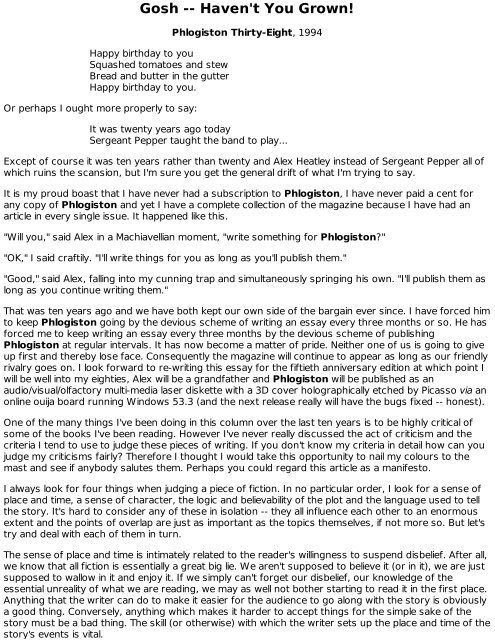Triffids Beard 2 - The Bearded Triffid
Triffids Beard 2 - The Bearded Triffid
Triffids Beard 2 - The Bearded Triffid
Create successful ePaper yourself
Turn your PDF publications into a flip-book with our unique Google optimized e-Paper software.
Gosh -- Haven't You Grown!<br />
Happy birthday to you<br />
Squashed tomatoes and stew<br />
Bread and butter in the gutter<br />
Happy birthday to you.<br />
Or perhaps I ought more properly to say:<br />
Phlogiston Thirty-Eight, 1994<br />
It was twenty years ago today<br />
Sergeant Pepper taught the band to play...<br />
Except of course it was ten years rather than twenty and Alex Heatley instead of Sergeant Pepper all of<br />
which ruins the scansion, but I'm sure you get the general drift of what I'm trying to say.<br />
It is my proud boast that I have never had a subscription to Phlogiston, I have never paid a cent for<br />
any copy of Phlogiston and yet I have a complete collection of the magazine because I have had an<br />
article in every single issue. It happened like this.<br />
"Will you," said Alex in a Machiavellian moment, "write something for Phlogiston?"<br />
"OK," I said craftily. "I'll write things for you as long as you'll publish them."<br />
"Good," said Alex, falling into my cunning trap and simultaneously springing his own. "I'll publish them as<br />
long as you continue writing them."<br />
That was ten years ago and we have both kept our own side of the bargain ever since. I have forced him<br />
to keep Phlogiston going by the devious scheme of writing an essay every three months or so. He has<br />
forced me to keep writing an essay every three months by the devious scheme of publishing<br />
Phlogiston at regular intervals. It has now become a matter of pride. Neither one of us is going to give<br />
up first and thereby lose face. Consequently the magazine will continue to appear as long as our friendly<br />
rivalry goes on. I look forward to re-writing this essay for the fiftieth anniversary edition at which point I<br />
will be well into my eighties, Alex will be a grandfather and Phlogiston will be published as an<br />
audio/visual/olfactory multi-media laser diskette with a 3D cover holographically etched by Picasso via an<br />
online ouija board running Windows 53.3 (and the next release really will have the bugs fixed -- honest).<br />
One of the many things I've been doing in this column over the last ten years is to be highly critical of<br />
some of the books I've been reading. However I've never really discussed the act of criticism and the<br />
criteria I tend to use to judge these pieces of writing. If you don't know my criteria in detail how can you<br />
judge my criticisms fairly? <strong>The</strong>refore I thought I would take this opportunity to nail my colours to the<br />
mast and see if anybody salutes them. Perhaps you could regard this article as a manifesto.<br />
I always look for four things when judging a piece of fiction. In no particular order, I look for a sense of<br />
place and time, a sense of character, the logic and believability of the plot and the language used to tell<br />
the story. It's hard to consider any of these in isolation -- they all influence each other to an enormous<br />
extent and the points of overlap are just as important as the topics themselves, if not more so. But let's<br />
try and deal with each of them in turn.<br />
<strong>The</strong> sense of place and time is intimately related to the reader's willingness to suspend disbelief. After all,<br />
we know that all fiction is essentially a great big lie. We aren't supposed to believe it (or in it), we are just<br />
supposed to wallow in it and enjoy it. If we simply can't forget our disbelief, our knowledge of the<br />
essential unreality of what we are reading, we may as well not bother starting to read it in the first place.<br />
Anything that the writer can do to make it easier for the audience to go along with the story is obviously<br />
a good thing. Conversely, anything which makes it harder to accept things for the simple sake of the<br />
story must be a bad thing. <strong>The</strong> skill (or otherwise) with which the writer sets up the place and time of the<br />
story's events is vital.


